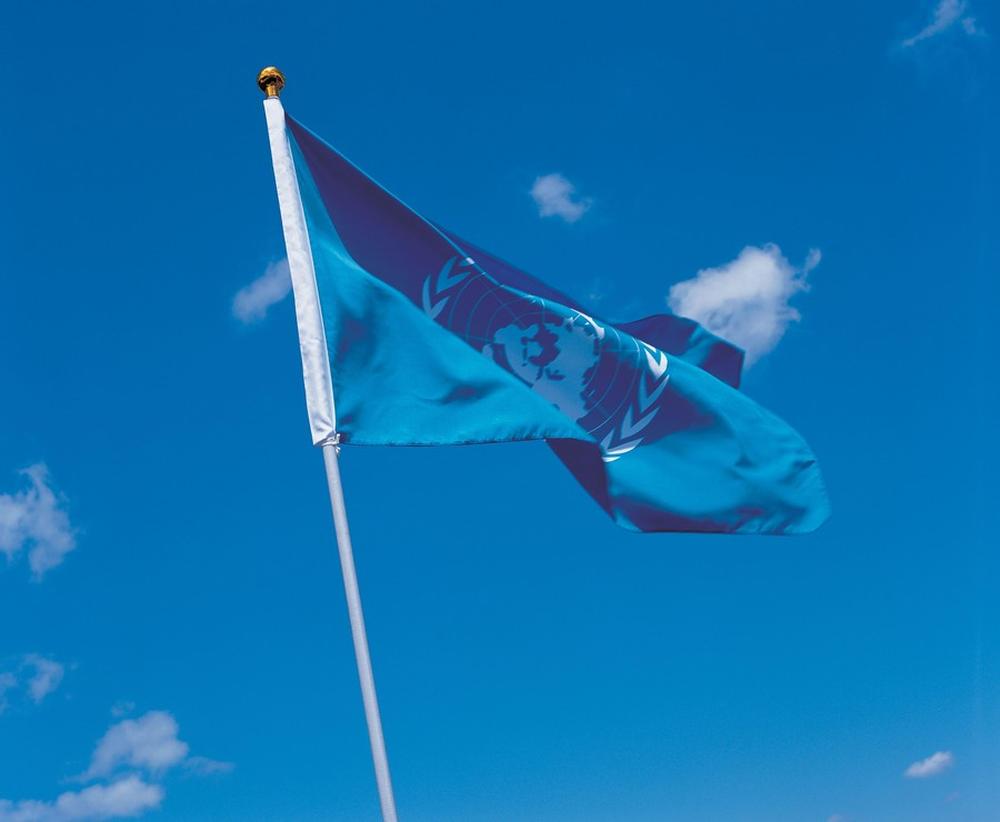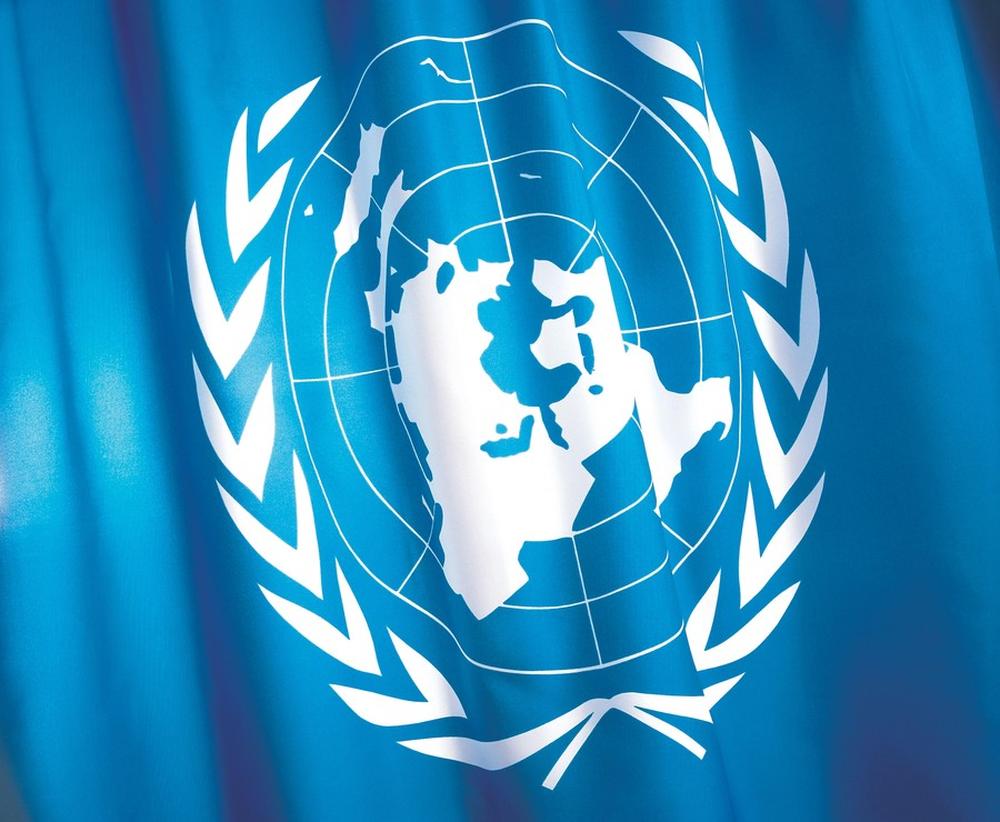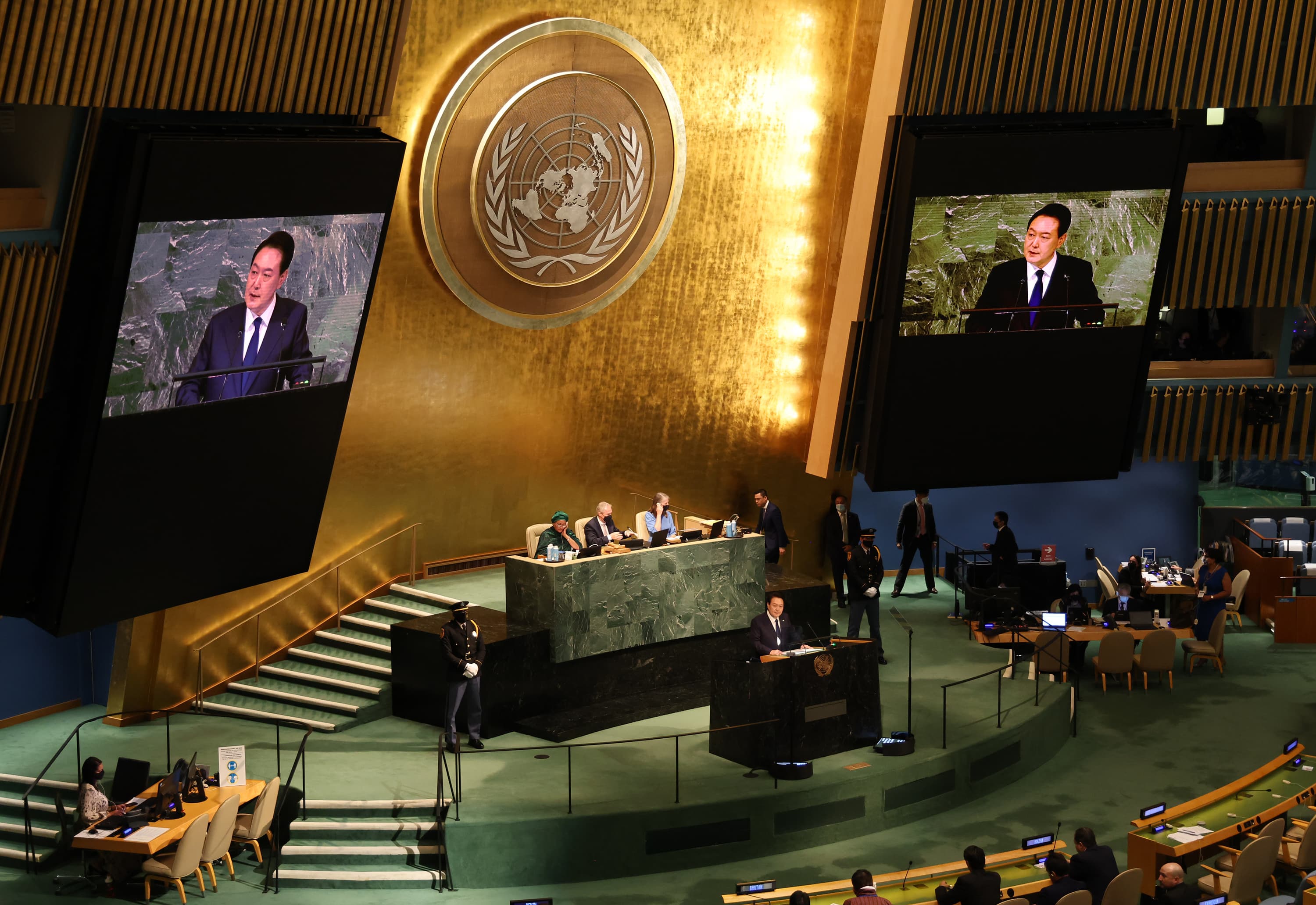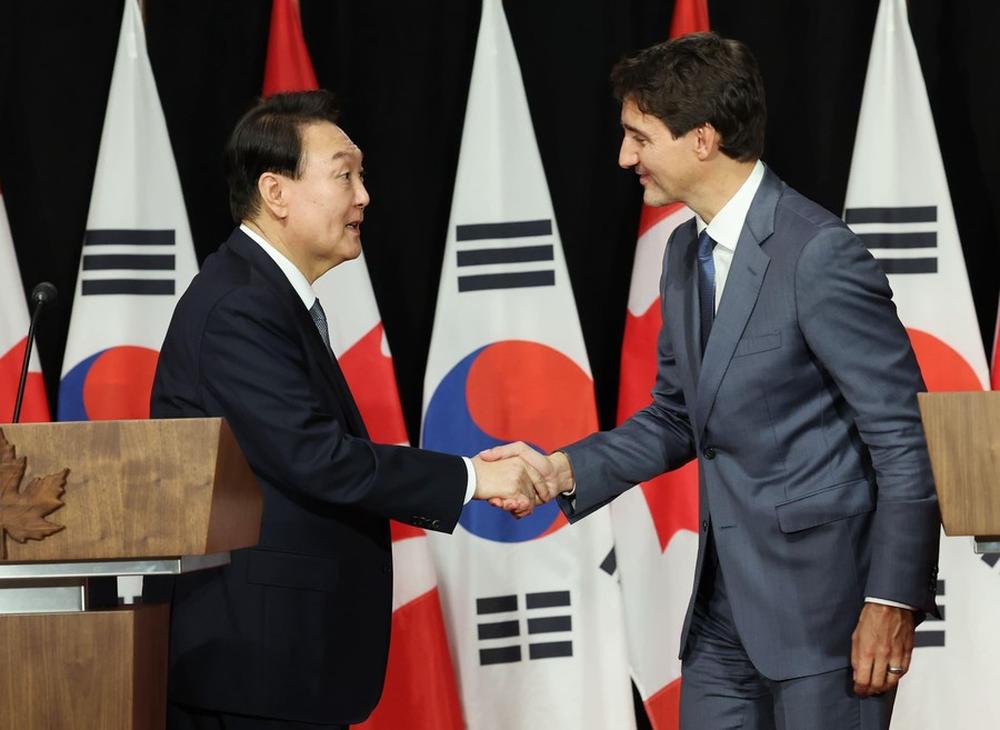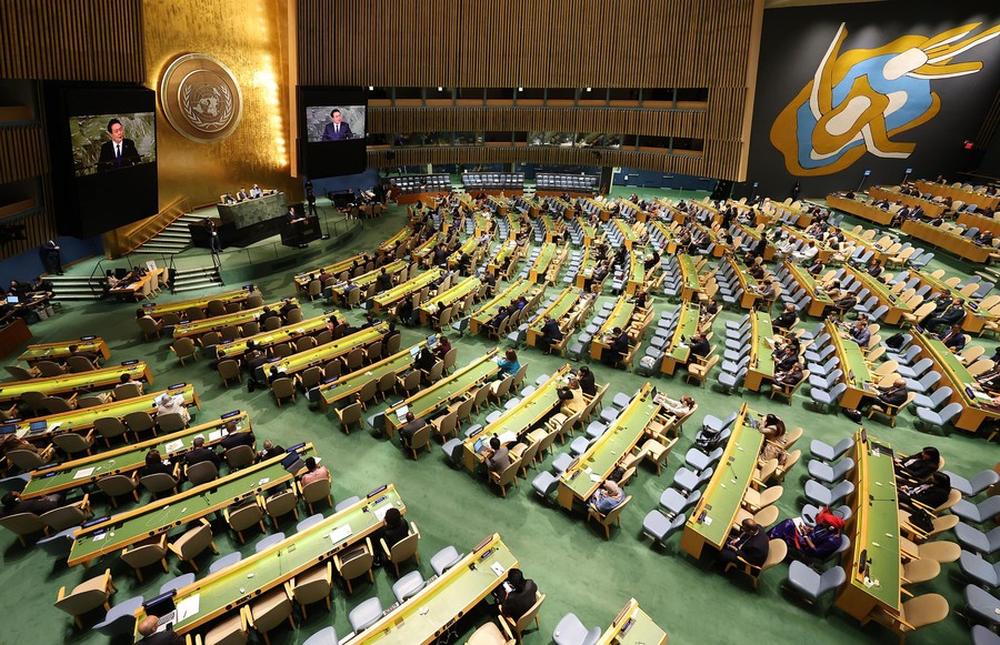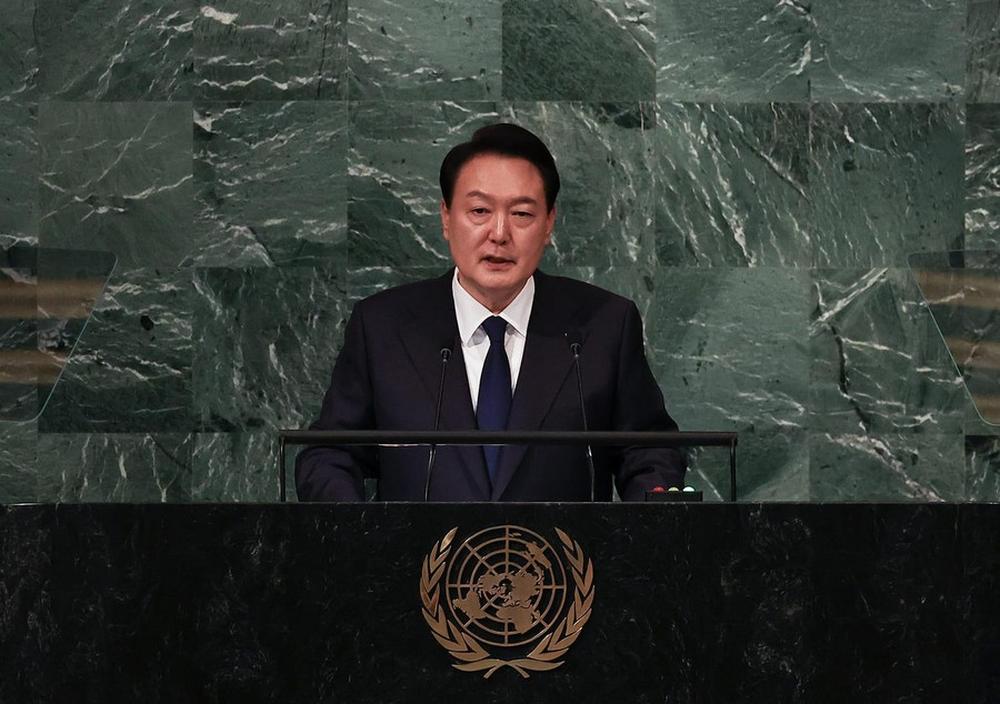- #Global Issues
- #Multilateral Relations
- #Nuclear & Missile Issues
- #South Korea
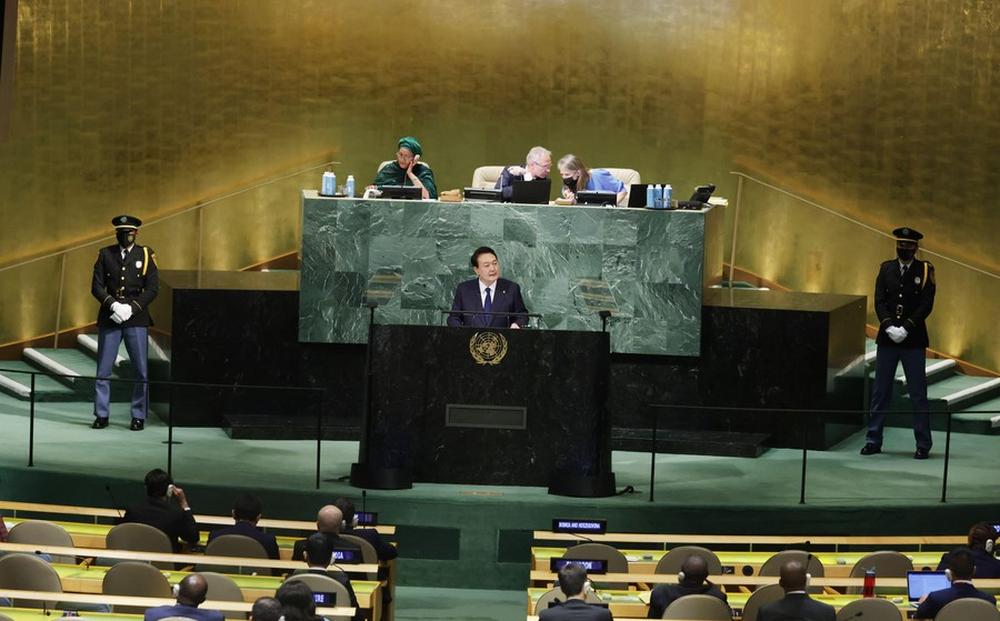
► During this year’s UNGA meeting on September 20, ROK President Yoon Suk Yeol delivered a keynote address titled “Freedom and Solidarity: Answer to the Watershed Moment,” in which he declared that “As a responsible member of the international community, Korea is committed to playing its due responsibility and role for the freedom of global citizens and prosperity of the global community.”
► Specifically, President Yoon offered several roadmaps to achieve these objectives. This paper will discuss the significance of President Yoon’s vision and determination from several perspectives.
The 77th UN General Assembly (UNGA) meeting this year was at the center of global attention. Not only was this the first in-person UNGA meeting in three years—the first since the outbreak of COVID-19, which took the lives of millions and led to global economic recession—it came at an important juncture in history when world peace was being threatened in various corners of the world. These threats include the shift in the global balance of power caused by Russia’s invasion of Ukraine on February 24, horrors and human rights violations caused by wars, and the growing threat of nuclear war.
During this year’s UNGA meeting on September 20, ROK President Yoon Suk Yeol delivered a keynote address titled “Freedom and Solidarity: Answer to the Watershed Moment,” in which he declared that “As a responsible member of the international community, Korea is committed to playing its due responsibility and role for the freedom of global citizens and prosperity of the global community.” Specifically, President Yoon offered several roadmaps to achieve these objectives. This paper will discuss the significance of President Yoon’s vision and determination from several perspectives.
First, President Yoon presented ‘Korea’s newfound identity” to the international community. He said that, “As we seek answers to the global crisis we are faced with, the viability of the UN system and the universal global norms architecture is under test.” As a solution, he added that “community of nations … must stand together in solidarity to defend that freedom.” His message served as a reminder that Korea exists today because of the UN’s great achievements. The Korean War on June 25, 1950 was caused by North Korea’s illegal surprise invasion and led to three years of national horrors for Koreans, which still remain today in the form of national division and ten million separated families. Despite such painful history, Korea was able to rise from the ashes of war, achieving stunning developments through “freedom and solidarity” offered by the UN and the international community. Today, Korea stands as the world’s tenth largest trading power. ‘Korea’s identity’ is the United Nations and it perfectly embodies the values of ‘freedom and solidarity.’ Today, many nations and peoples torn apart by conflicts and national division dream of becoming the next Korea, which is why President Yoon’s speech at the UNGA meeting has resonated with so many countries.
Second, President Yoon identified global conflicts and divisions as everyone’s problems and has offered ‘freedom and solidarity’ as a solution. Russia’s invasion of Ukraine on February 24 started a war that has continued for seven months—wreaking havoc in Ukraine through indiscriminate bombings and inhumane acts of violence. The end appears nowhere in sight. Atrocious human rights violations and indiscriminate attacks against civilians that are being reported by the media, in addition to the growing threat of a “nuclear war,” have pushed China and North Korea to engage in provocative actions that are threatening regional stability. The world is now suffering from inflation caused by food and energy shortages. ‘Freedom and solidarity’ must be the starting point in our path toward solutions. During his speech, President Yoon did not mention inter-Korean relations, leading to various interpretations. When we look back 72 years, specifically at the origin of the Korean War, history has clearly proven that the war took place as part of a shift in balance of power caused by the Soviet Union. Given that Ukraine—similar to Korea during the Korean War—is now facing the pain of national division and tragedy, it is high time for the global community to rally around the UN. In that sense, the importance of ‘freedom and solidarity’ cannot be overstated. President Yoon’s UNGA speech showed Korea’s determination to go beyond inter-Korean relations and share the pain experienced by nations in Africa, the Middle East, and South America. For Korea, overcoming national division, dealing with the threat of North Korea’s nuclear first-strike, and bringing about peaceful unification of the Korean Peninsula are all important priorities that require great self-effort and determination. His speech, however, stressed that values such as ‘freedom and solidarity’ and working with one another is key to resolving many of these issues. History has taught us that crisis presents new opportunities. As such, it is now time for us to ‘aim higher and further.’
Third, President Yoon confirmed Korea’s determination to work with the UN and provided a roadmap for Korea’s role as a global pivotal state to carry out the values of ‘freedom and solidarity.’ This roadmap included sharing new and renewable energy technologies with others in pursuit of decarbonization, sharing advanced digital technology and data to narrow the digital divide, scaling up its commitment to green ODA, pledging $300 million toward the ACT-A Initiative and $30 million to the Financial Intermediary Fund of the World Bank, hosting ministerial meeting of the Global Health Security Agenda (GHSA) to ensure a more effective response to future infectious disease outbreaks, and increasing its contribution to the Global Fund, among others. Identifying problems is one thing but overcoming obstacles and working towards a solution is another. This is especially the case when conflicts between and among states stand in the way of cooperation. In addressing these challenges, ‘freedom and solidarity’ are universal values that can guide our way towards a better future.
Finally, President Yoon expressed Korea’s determination to stand side-by-side with the UN. The world, including Korea, has learned the lesson that ‘freedom is not free.’ The values promoted by the UN for world peace propel people to sacrifice their lives even for the countries they know nothing about. ‘Freedom and solidarity’ are UN’s values and serve as its compass. In the latter part of his speech, President Yoon said that, “As a responsible member of the international community, Korea is committed to playing its due responsibility and role for the freedom of global citizens and prosperity of the global community.” This is one of the reasons why UN Secretary General António Guterres and the countries that yearn for world peace have lauded President Yoon’s keynote address. Making the correct transition will require going beyond mutual interests and must be based on the fundamental values preached by the UN. As part of this effort, reforming the UN in order to prevent certain countries from deviating from its values will become an important task in the years ahead.
The UN General Assembly serves as an important occasion during which all member countries come together to share their perceptions of international affairs and confirm their solidarity towards world peace. Korea is a country that was born anew as part of this process. Korea is, therefore, the great product of the UN process and exemplifies UN’s identity. Korea must open its heart to better deal with conflicts and wars taking place around the world, including Ukraine, and to bring peace to those areas. Global and regional divides, racial injustice, and borders involving gender and politics should cease to exist. I hope that all nations will look to the future with ‘freedom and solidarity’ in mind.
0 Professor, Korea National Defense University(2016-) 0 President, Korea Defense Diplomacy Association(2018-) *韓国国防外交協会 会長 0 Vice President, Korea Defense Association(2019-) 0 Special Advisor, ROK Army Chief of Staff(2020-) 0 Special Advisor, Joint Chief of Staff(2018-) 0 Korea Defense Attache to the Japan(2011-2015) 0 Korea Army Attache to the Japan(2005-2008) 0 Senior Officer for International Policy, Ministry of National Defense(2000-2004)
